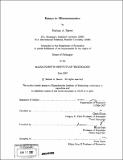| dc.contributor.advisor | Glenn Ellison and Haluk Ergin. | en_US |
| dc.contributor.author | Bárczi, Nathan | en_US |
| dc.contributor.other | Massachusetts Institute of Technology. Dept. of Economics. | en_US |
| dc.date.accessioned | 2007-12-07T16:11:41Z | |
| dc.date.available | 2007-12-07T16:11:41Z | |
| dc.date.copyright | 2007 | en_US |
| dc.date.issued | 2007 | en_US |
| dc.identifier.uri | http://hdl.handle.net/1721.1/39715 | |
| dc.description | Thesis (Ph. D.)--Massachusetts Institute of Technology, Dept. of Economics, 2007. | en_US |
| dc.description | Includes bibliographical references. | en_US |
| dc.description.abstract | This dissertation consists of three essays in microeconomic theory. The first two concern methods of modeling bounded rationality and unawareness, while the third applies a model of jointly determined reputation to incentive problems in the market for expert advice. Increases in awareness information can be associated with dramatic increases in certainty or uncertainty. The first chapter of this dissertation seeks to unify both phenomena under a single framework of epistemic negligence, or errors in an agent's epistemic relation to tautological beliefs. It is shown that impossible possible worlds (excess uncertainty) result from a failure to believe all tautologies, while possible impossible worlds (excess certainty) result from belief in 'tautologies' which may in fact be false. A propositional model is employed throughout the paper, and several of its properties are compared to the standard state-space model, which implicitly assumes that epistemic negligence does not exist. Chapter 2 continues to work with a propositional model of knowledge, focusing more closely on agents who fail to take into account all relevant dimensions of uncertainty. | en_US |
| dc.description.abstract | (cont.) We show that in such a setting, if agents' learning makes them better off over time, then (1) they may suffer from delusion, but only in a proscribed way that is consistent over time, and (2) contrary to standard conceptions of learning, it is possible for them to rule in 'states of the world' that they had previously ruled out, because by doing so they increasingly avoid overconfident mistakes. As a separate concern, and in light of recent corporate scandals, chapter 3 develops a theoretical model designed to address the question of whether reputational concerns can discipline providers of expert advice to exert costly but accuracy-enhancing effort. The primary finding of the paper is that the effort exerted by an expert can be highly sensitive to whether its reputation is determined by its effort alone or whether the firm it is evaluating also has a costly action available to it, by which it too can influence the expert's reputation for accuracy. We characterize equilibria in these two settings, and they are found to differ in several interesting ways, which shed some light on the concerns of federal authorities that credit rating agencies applied insufficient effort to their evaluation of firms such as Enron. | en_US |
| dc.description.statementofresponsibility | by Nathan A. Barcuzi. | en_US |
| dc.format.extent | 115 p. | en_US |
| dc.language.iso | eng | en_US |
| dc.publisher | Massachusetts Institute of Technology | en_US |
| dc.rights | M.I.T. theses are protected by copyright. They may be viewed from this source for any purpose, but reproduction or distribution in any format is prohibited without written permission. See provided URL for inquiries about permission. | en_US |
| dc.rights.uri | http://dspace.mit.edu/handle/1721.1/7582 | |
| dc.subject | Economics. | en_US |
| dc.title | Essays in microeconomics | en_US |
| dc.type | Thesis | en_US |
| dc.description.degree | Ph.D. | en_US |
| dc.contributor.department | Massachusetts Institute of Technology. Department of Economics | |
| dc.identifier.oclc | 179923696 | en_US |
